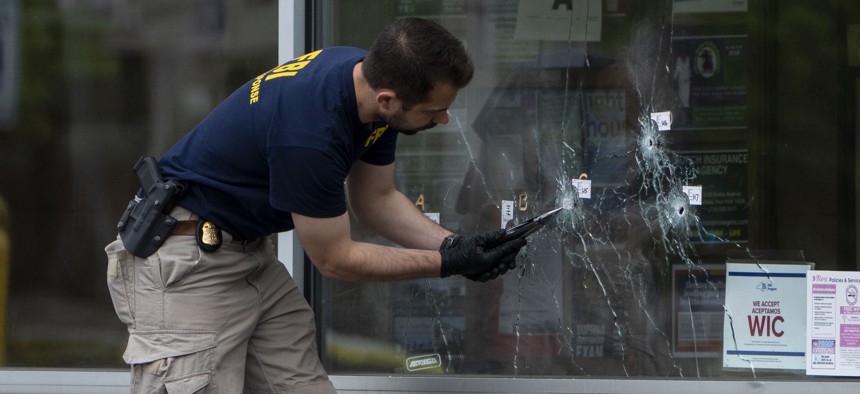Why contractors should care about the Buffalo shooting

An FBI investigator collects evidence from bullet holes in the window of Tops Friendly Market, the scene of the fatal shooting of 10 people in Buffalo, New York. Gettyimages.com/ Kent Nishimura / Contributor
Saturday's tragic event is a stark reminder of the work still to be done in addressing racism in the U.S., an effort contractors have a role in.
Saturday's mass shooting in Buffalo combined two American traditions -- gun violence and racism.
Many of the reactions also are traditional -- prayers for the victims, expressions of outrage, political posturing -- to name a few.
The shooter espoused beliefs known as the Great Replacement Theory, a conspiracy theory that pushes the idea that white people are being intentionally replaced by non-whites and immigrants. His goal was to kill Black people.
For decades, demographics in the U.S. have been shifting (and are continuing to shift) from a majority white population to a population that doesn’t have a majority ethnic group.
That change is accelerating because the white population is at least twice as old as other groups and has a lower birthrate.
An analysis of Census data by Pew Research shows 58 as the most common age among whites. That number is 11 for Hispanics, 27 for Black people and 29 for Asians.
That means the U.S. is undergoing a deep, significant and fundamental change. Fear of change drives schools of thought such as the Great Replacement Theory.
A similar fear of change also is what drives many of the anti-gay and anti-transgender laws that have been adopted across many states.
The Great Replacement Theory is not necessarily new. A column in the Washington Post chillingly recalls the mass killing of Black Americans in 1873 in Colfax, Louisiana. That was a violent reaction to Reconstruction, which was trying to bring change to the former Confederate states in the wake of the Civil War and end of slavery.
So why should the leaders of government contracting firms be concerned about the mass shooting in Buffalo and the Great Replacement Theory?
The killing of George Floyd two years ago triggered actions across the industry to address systemic racism, diversity, equity and inclusion. Companies developed resource groups around these issues and many created incentive plans for managers to ensure that teams were diverse and that more voices were heard.
The mass shooting in Buffalo should reinvigorate those actions and conversations.
We need to acknowledge that our society and country is changing and that change is hard and scary.
Conspiracy theories like the Great Replacement are so seductive because they feed into our fears. Those ideas lead people to feel they are the victim. That something is being done to them or taken from them.
But we can’t give into our fears. Fear feeds anger and anger is irrational and often dangerous.
Unfortunately, our politics today thrive on fear and anger. For one side to win, the other side must lose. The incentive to find common ground is very small.
But the common ground is where we need to live. As a white male: I think I can empathize with what women, Black Americans, immigrants, and the LBGTQ community go through daily. But I don’t think I can truly feel it.
What I can do is listen and recognize that what these groups experience is real. I can question my actions. Fear is a natural emotion, but I need to ask what am I afraid of?
But it’s hard. The easy thing is to surround oneself with the familiar and comfortable. To resist change.
As businesses that want to do the right thing and grow and be profitable, resisting change isn’t an option for government contractors and especially when it deals with people. Racism and prejudice are people issues.
In each interview I conduct and every panel or roundtable I host, the discussions always land on people issues.
Executives talk a lot about culture. Since Floyd’s murder they talk about diversity, equity and inclusion as important values of their company cultures.
The mass shooting in Buffalo is another reminder that there is work to be done in our country to address these issues. The workplace -- including hiring and promotion practices, culture, incentive policies -- have a significant role to play in getting that work done.
As Martin Luther King Jr. said: “In the end, we will remember not the words of our enemies, but the silence of our friends.”
This is not a time for government contractors to be silent. No one should be silent.
NEXT STORY: Best-in-class, or worst-in-class?


